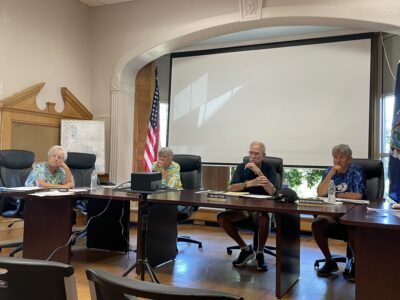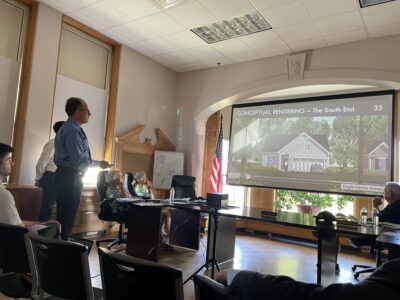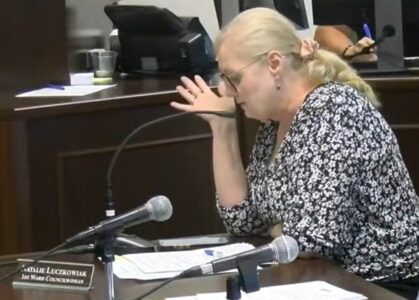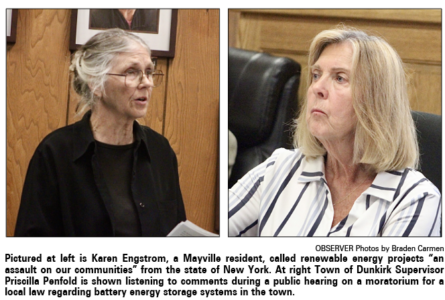Zoning board backs development at former golf course
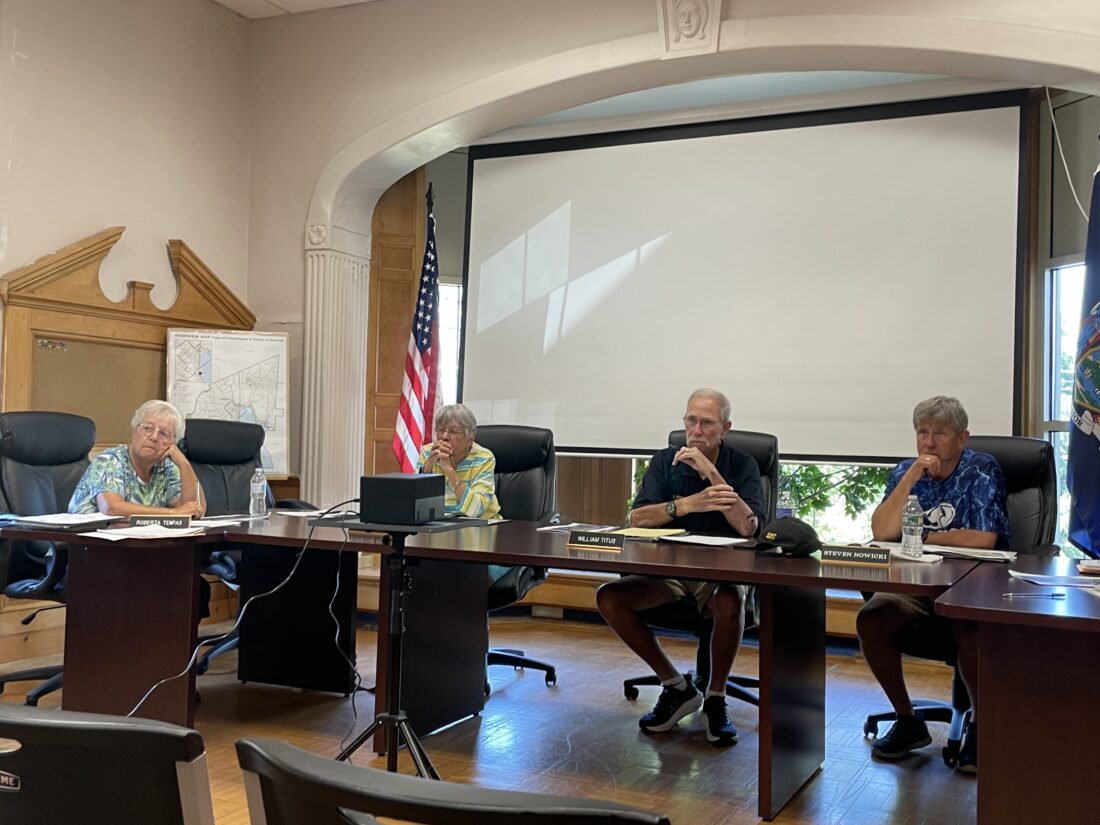
The Chautauqua Town Zoning Board of Appeals voted 3-1 in favor of recommending a Special Use permit to Ellicott Development for their $70 million project at the former Point Chautauqua Golf Course. From left: Board member Roberta Tenpas voted no while Sandralee Wagner, William Titus and Steven Nowicki voted yes. The town board will have the final vote.
- The Chautauqua Town Zoning Board of Appeals voted 3-1 in favor of recommending a Special Use permit to Ellicott Development for their $70 million project at the former Point Chautauqua Golf Course. From left: Board member Roberta Tenpas voted no while Sandralee Wagner, William Titus and Steven Nowicki voted yes. The town board will have the final vote.
- OBSERVER Photos by Gregory Bacon Attorney Sean Hopkins shows a rendering of a single family house that would be constructed in Sunset View at the former Point Chautauqua Golf Course property.
On Tuesday, the Chautauqua Town Zoning Board of Appeals voted 3-1 in favor issuing a Special Use permit for Sunset View, the housing and commercial development proposed on 35.5 acres of land at 5687 East Lake Road, where Point Chautauqua Golf used to be located.
The zoning board’s vote is considered a recommendation, so the project now goes to the Chautauqua Town Board for a final vote. A public hearing has been set for Oct. 8.
The development, called Sunset View, will have a mixture of high quality residential living. There will be a mixture of owner occupied properties as well as short- and long-term rentals.
There will be recreational amenities for residents and guests, including a pool, a dog park, pickleball courts, a spa, and walking trails.
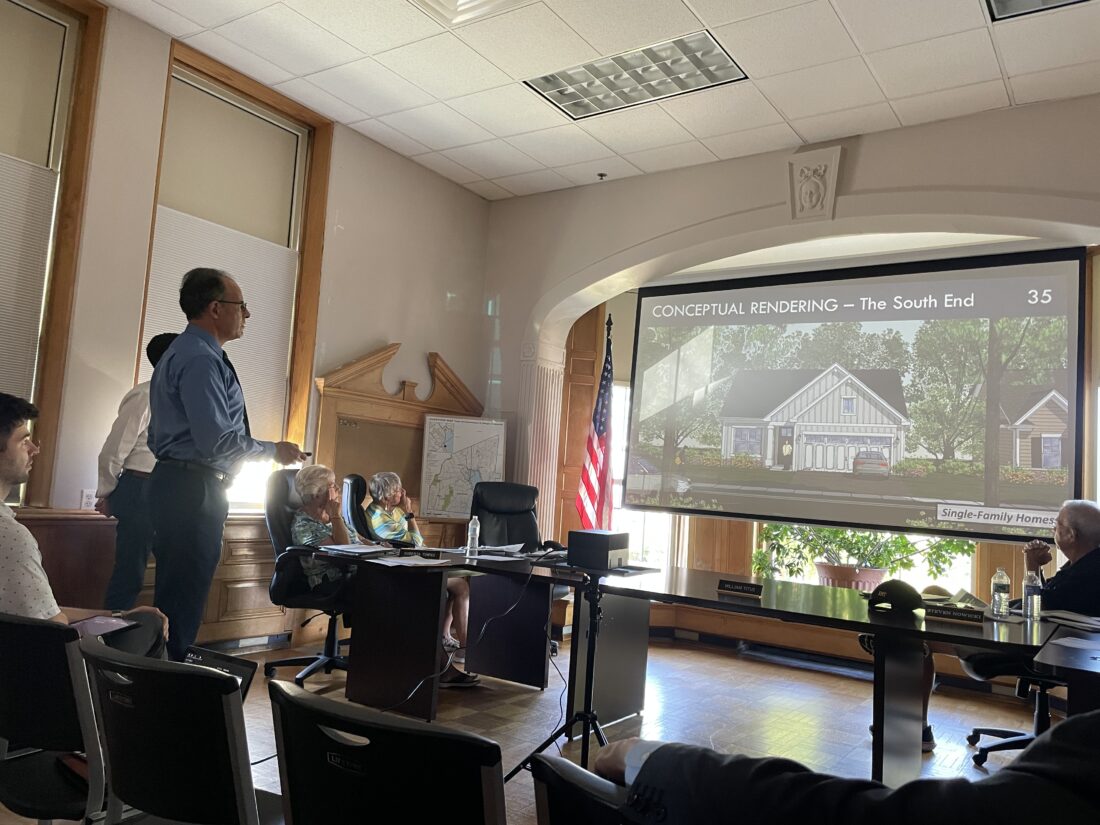
OBSERVER Photos by Gregory Bacon Attorney Sean Hopkins shows a rendering of a single family house that would be constructed in Sunset View at the former Point Chautauqua Golf Course property.
It is also proposed to have a restaurant/tap house which would be open to the general public.
The entire project would have up to 194 residents there. One section would be a mixed-use building for condominium living. Another section is made up of 27 townhomes. The third section would have 32 lots for single family homes.
The property is surrounded by three different living communities – Chautauqua Lake Estates, the Villas at Chautauqua Point, and Point Chautauqua Neighborhood.
Before the zoning board’s vote some residents in those communities voiced their opposition to either parts of the project, or the project as a whole.
One resident noted that the project has very little lakefront access, yet they are proposing a large dock for a number of boats. He felt the number was excessive, especially compared to the other living facilities in the area.
Another resident complained that the development will “destroy the only lakeside golf course” in the town.
He said he would “rather have solar panels out there that could be ripped up in five years,” instead of a new housing and commercial development.
One woman who said she previously lived in Buffalo expressed displeasure with the developer Ellicott Development.
Another woman said she wants to see fewer private homes constructed and have them face a different direction.
Attorney Joe Calimeri, who has been hired by Point Chautauqua, submitted a conceptual alternative plan which would reduce the number of town homes from 118 to 111, reducing the number of single family homes from 32 to 23, and adding a 50-foot vegetative buffer.
Attorney Sean Hopkins with Ellicott Development said they were not interested in further reduction. “We’ve come far enough so at this point we’re going to proceed with the project we have,” he said, noting the original project had 210 residential living units, which has been reduced to 194.
Calimeri was not in attendance at Tuesday’s meeting, but Hopkins alleged that the alternative design was submitted “to create a record and prepare to file the Article 78 petitions.”
Article 78 proceedings are lawsuits mainly used to challenge an action (or inaction) by agencies of state and local governments, meaning that it appears the residents are preparing to take the project to the state Supreme Court should the town board approve a Special Use permit.
When the time came to vote, zoning board members Sandralee Wagner, Steven Nowicki and Chairman William Titus voted in favor while Roberta Tenpas voted against it.
After the vote, residents began booing the zoning board, and a couple of people thanked Tenpas for voting no.
Hopkins said during the meeting developers would like to start construction in the spring and that it would take a minimum of three years to complete, and much likely longer.

